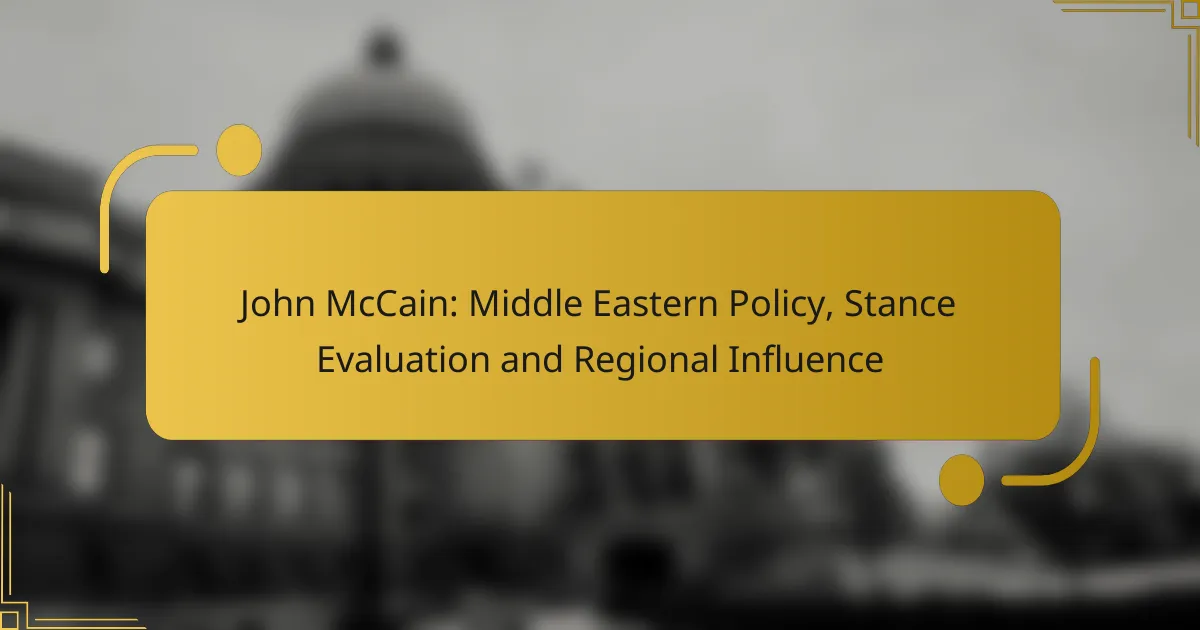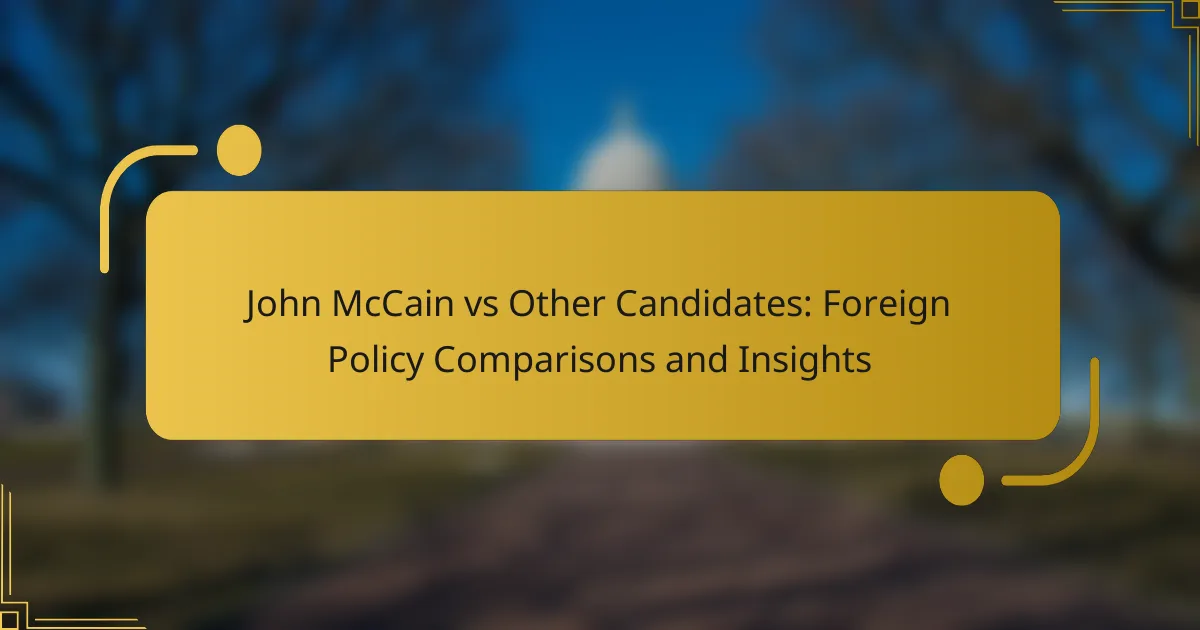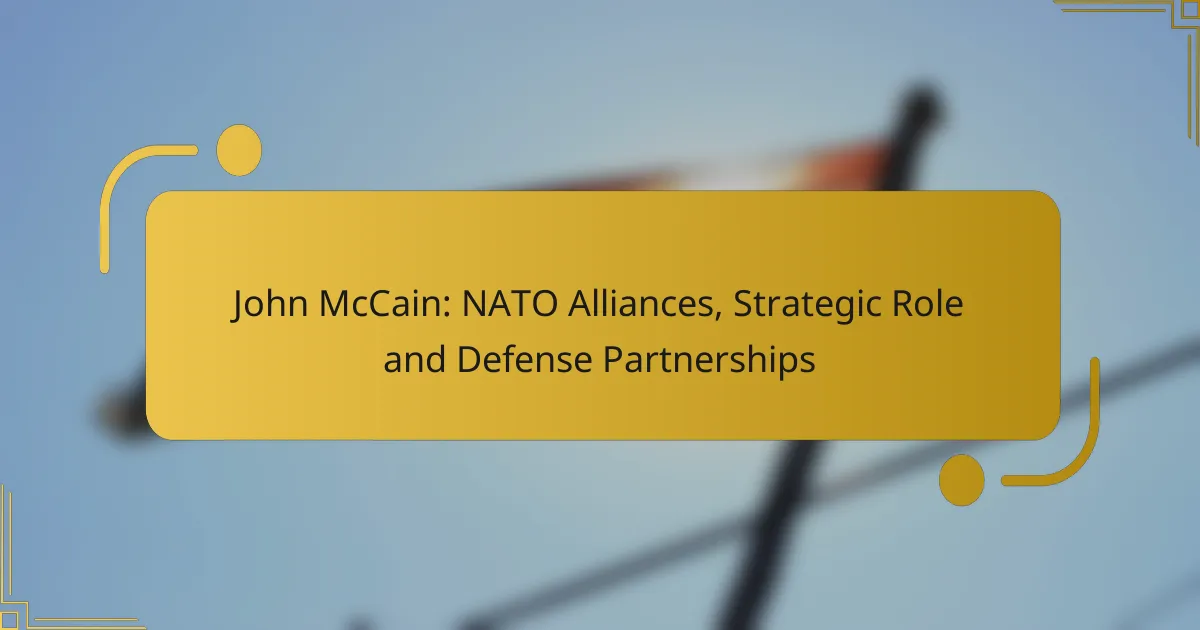John McCain’s Middle Eastern policy was marked by a commitment to a strong military presence and support for democratic movements, aiming to counter extremist threats and promote regional stability. His advocacy for Israel, opposition to Iran’s nuclear ambitions, and support for the Syrian opposition underscored his influence on U.S. relations in the region, reflecting a belief in the necessity of active engagement and intervention.

What is John McCain’s Middle Eastern policy?
John McCain’s Middle Eastern policy emphasized a strong military presence, support for democratic movements, and a robust counterterrorism strategy. His approach aimed to promote stability in the region while addressing threats posed by extremist groups.
Support for military intervention
John McCain advocated for military intervention as a necessary tool for addressing conflicts in the Middle East. He believed that a decisive military response could deter aggression and support allies facing threats, particularly in countries like Syria and Iraq.
McCain’s support for intervention often included airstrikes and the provision of military aid to local forces. He argued that such actions were essential to prevent the spread of terrorism and to protect U.S. interests in the region.
Promotion of democracy
McCain was a strong proponent of promoting democracy in the Middle East, viewing it as a pathway to stability and peace. He believed that democratic governance could help counteract extremism and foster a more favorable environment for U.S. interests.
His support for democratic movements included backing protests against authoritarian regimes and advocating for free elections. McCain often highlighted the importance of civil society and human rights as integral components of a successful democratic transition.
Focus on counterterrorism
Counterterrorism was a cornerstone of McCain’s Middle Eastern policy, as he recognized the persistent threat posed by groups like ISIS and al-Qaeda. He emphasized the need for a comprehensive strategy that combined military action with intelligence and diplomatic efforts.
McCain supported international coalitions to combat terrorism and advocated for increased funding for intelligence operations. He believed that addressing the root causes of extremism, such as poverty and lack of education, was crucial for long-term success in counterterrorism efforts.
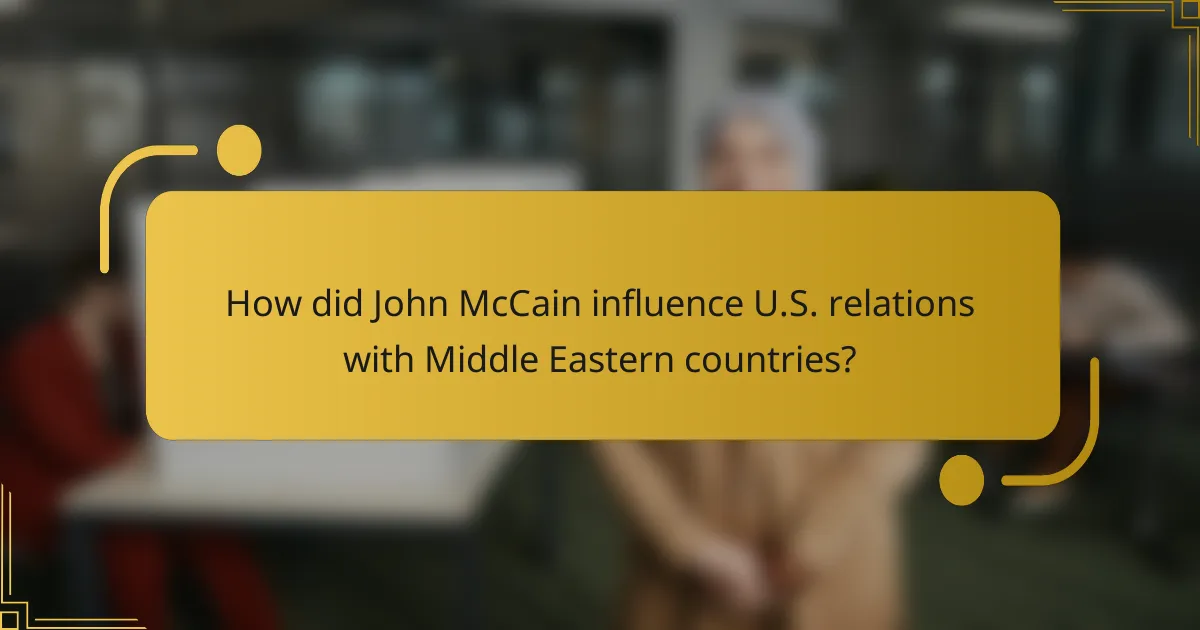
How did John McCain influence U.S. relations with Middle Eastern countries?
John McCain significantly shaped U.S. relations with Middle Eastern countries through his strong support for Israel, opposition to Iran’s nuclear ambitions, and advocacy for democratic movements during the Arab Spring. His policies aimed to strengthen alliances and promote stability in the region.
Strengthened ties with Israel
McCain was a staunch ally of Israel, advocating for military and financial support to bolster its defense capabilities. He believed that a strong Israel was crucial for U.S. interests in the Middle East and often criticized any policies he viewed as detrimental to Israeli security.
His commitment included support for initiatives like the U.S.-Israel Enhanced Security Cooperation Act, which aimed to increase military aid. This approach helped solidify a strategic partnership that continues to influence U.S. foreign policy today.
Opposition to Iran’s nuclear program
McCain was a vocal opponent of Iran’s nuclear program, arguing that it posed a significant threat to regional and global security. He supported sanctions and diplomatic efforts aimed at curbing Iran’s nuclear ambitions, believing that a strong stance was necessary to deter aggression.
He often emphasized the need for a united front among U.S. allies to counter Iran, advocating for measures that included military readiness and economic pressure. This approach aimed to prevent Iran from becoming a nuclear power and destabilizing the region.
Advocated for Arab Spring support
During the Arab Spring, McCain championed U.S. support for democratic movements in the Middle East, believing that promoting democracy would lead to long-term stability. He called for intervention in Libya and supported efforts to aid opposition groups in Syria.
McCain argued that the U.S. should stand with those seeking freedom and democracy, viewing it as a moral obligation. His advocacy highlighted the importance of U.S. leadership in promoting democratic values, although the outcomes of such interventions have been mixed and remain a topic of debate.
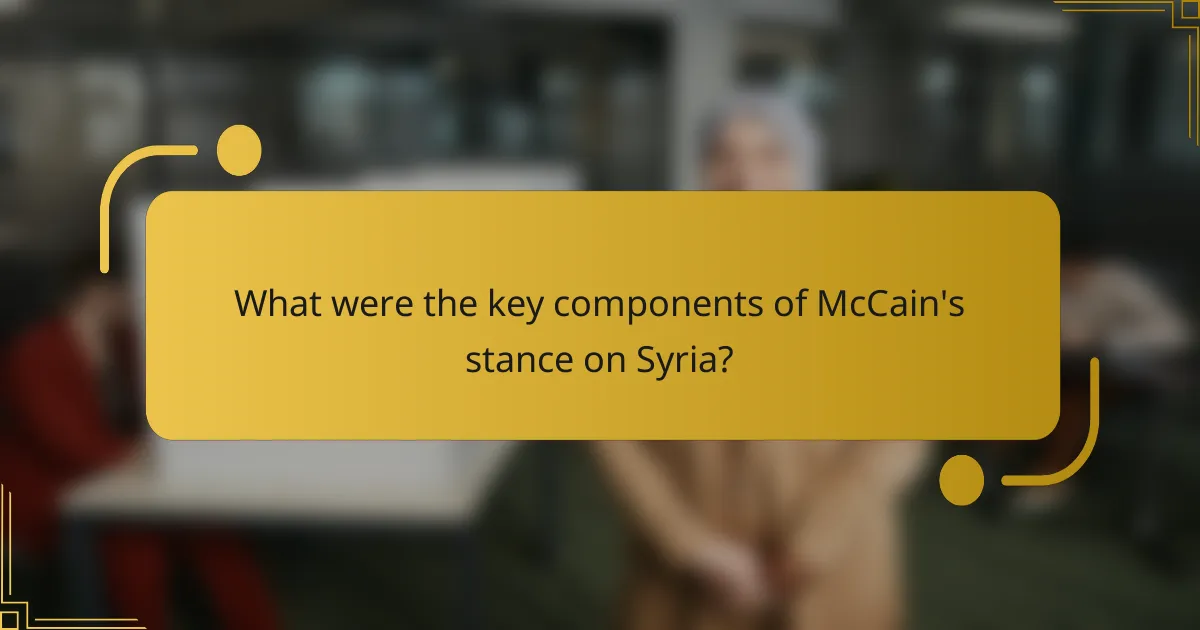
What were the key components of McCain’s stance on Syria?
John McCain’s stance on Syria was characterized by strong support for the opposition against President Bashar al-Assad, advocating for military intervention, and promoting humanitarian assistance. He believed in actively supporting rebel groups to foster a democratic transition in Syria.
Support for rebel groups
McCain consistently called for U.S. support for various rebel factions fighting against the Assad regime. He argued that equipping and training moderate opposition forces was essential to counteract extremist elements and promote a democratic outcome in Syria.
His advocacy included backing the Free Syrian Army and other groups that aligned with U.S. interests, emphasizing the need for a strategic approach to ensure that support did not inadvertently empower extremist factions.
Calls for military action against Assad
McCain was a vocal proponent of military intervention in Syria, arguing that airstrikes against Assad’s forces were necessary to protect civilians and deter further atrocities. He believed that a robust military response could shift the balance of power in favor of the opposition.
He often highlighted the importance of establishing no-fly zones and safe havens for displaced Syrians, viewing these measures as critical steps to safeguard civilians and facilitate humanitarian efforts.
Humanitarian aid initiatives
In addition to military support, McCain emphasized the need for significant humanitarian aid to address the crisis in Syria. He advocated for increased funding to assist refugees and internally displaced persons, recognizing the dire conditions many faced.
McCain’s initiatives included pushing for coordinated efforts among international partners to deliver food, medical supplies, and shelter, aiming to alleviate suffering and stabilize the region amidst ongoing conflict.

How did McCain’s views evolve over time?
John McCain’s views on Middle Eastern policy evolved significantly throughout his political career, shifting from a more isolationist stance to one that favored interventionism. This transformation was influenced by global events, particularly the September 11 attacks and the subsequent geopolitical changes in the region.
Shift from isolationism to interventionism
In the early years of his political career, McCain often advocated for a more isolationist approach, emphasizing diplomacy over military intervention. However, as global threats became more pronounced, he began to support a proactive military stance, believing that the U.S. had a responsibility to promote democracy and stability in the Middle East.
This shift was marked by his increasing support for military actions in Iraq and Afghanistan, where he argued that intervention was necessary to combat terrorism and authoritarian regimes. McCain’s belief in the importance of American leadership in global affairs became a cornerstone of his later policies.
Response to 9/11 events
The September 11 attacks in 2001 were a pivotal moment for McCain, catalyzing his transition to a more interventionist policy. He viewed these attacks as a direct threat to U.S. national security, prompting him to advocate for military action against terrorist organizations and their state sponsors.
McCain’s response included strong support for the wars in Afghanistan and Iraq, where he believed that military intervention was essential to dismantle terrorist networks and prevent future attacks. He consistently argued that failing to act would lead to greater instability and danger.
Adaptation to changing geopolitical landscapes
As the geopolitical landscape in the Middle East evolved, McCain adapted his views to address new challenges. He recognized the rise of ISIS and the complexities of the Syrian civil war, advocating for a robust U.S. response to counter these threats.
McCain emphasized the need for a comprehensive strategy that included military action, support for allies, and diplomatic efforts. His approach reflected a nuanced understanding of the region’s dynamics, balancing military intervention with the necessity of fostering local partnerships to achieve long-term stability.
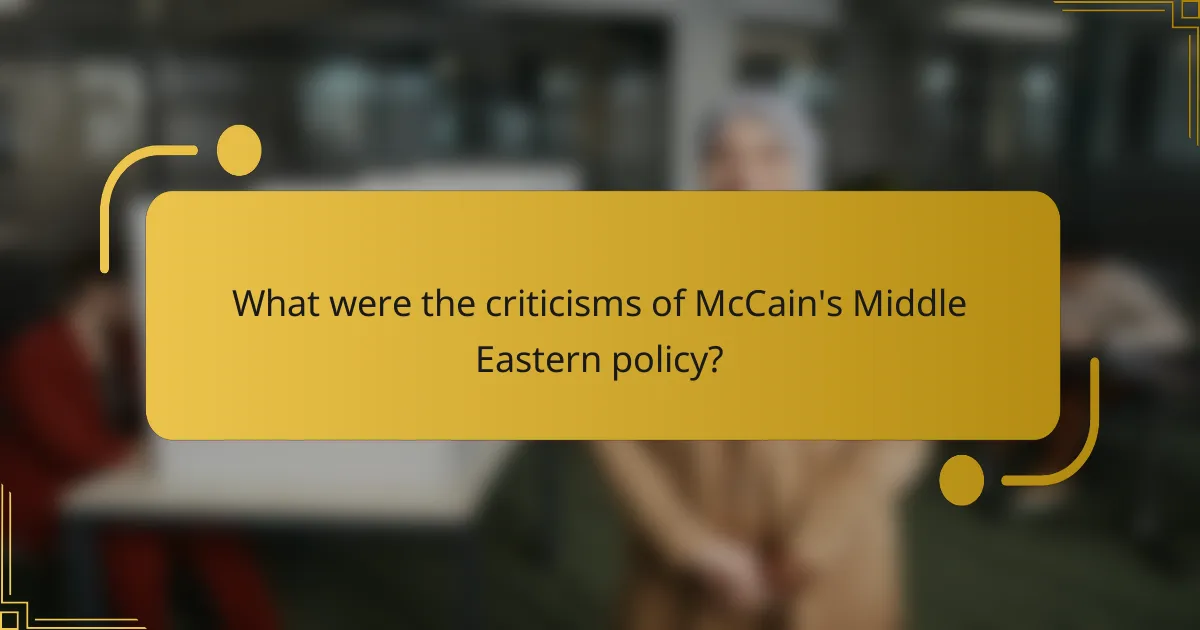
What were the criticisms of McCain’s Middle Eastern policy?
John McCain’s Middle Eastern policy faced significant criticisms, primarily centered on his aggressive military stance and promotion of democracy in the region. Critics argued that his approach often led to unintended consequences and questioned the overall effectiveness of his strategies.
Perceived overreach in military engagements
Many critics viewed McCain’s support for military interventions, such as in Iraq and Libya, as an overreach that destabilized the region. His advocacy for increased military presence was seen as a failure to recognize the complexities of local politics and the potential for backlash against U.S. involvement.
This military overreach raised concerns about the sustainability of U.S. influence in the Middle East, with some arguing that it exacerbated anti-American sentiments and fueled extremism. The long-term consequences of these engagements often overshadowed short-term gains.
Concerns about unintended consequences
Critics highlighted that McCain’s policies frequently led to unintended consequences, such as the rise of ISIS following the Iraq War. The removal of authoritarian regimes without a clear plan for governance often resulted in power vacuums that extremist groups exploited.
These unintended outcomes prompted debates about the wisdom of military interventions and the need for a more nuanced approach that considers local dynamics and the potential for destabilization.
Debates over effectiveness of democracy promotion
McCain’s strong advocacy for democracy promotion in the Middle East was met with skepticism. Critics argued that imposing democratic frameworks without considering cultural and historical contexts often led to instability rather than progress.
Furthermore, the effectiveness of such promotion was questioned, as many countries in the region experienced turmoil rather than democratic governance. This raised important discussions about the feasibility of exporting democracy and the need for tailored strategies that respect local traditions and governance structures.
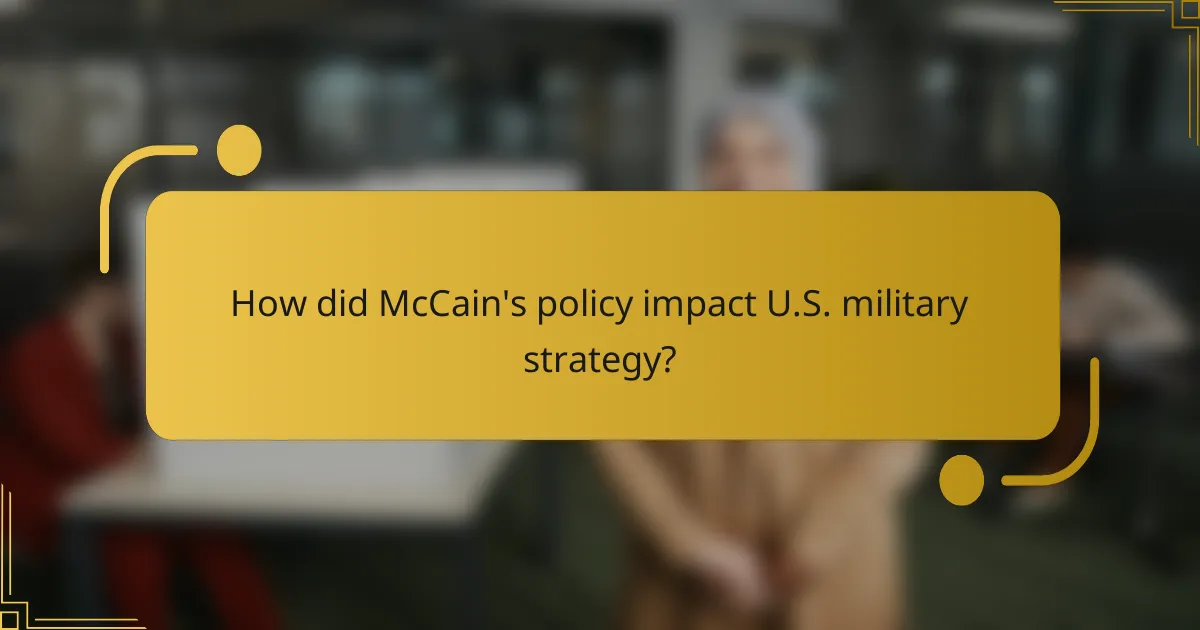
How did McCain’s policy impact U.S. military strategy?
John McCain’s policy significantly influenced U.S. military strategy by advocating for a robust military presence in the Middle East. His approach emphasized intervention and support for allies, shaping the U.S. response to regional conflicts and threats.
Increased military presence in the region
McCain’s stance on military presence in the Middle East called for a substantial U.S. footprint to deter aggression and support democratic movements. He believed that a visible military commitment would reassure allies and counteract the influence of adversaries like Iran.
As a result, McCain supported initiatives that led to the deployment of additional troops and resources in conflict zones such as Iraq and Syria. This included advocating for airstrikes against ISIS and bolstering support for local forces, which aimed to stabilize the region and promote U.S. interests.
Key considerations included balancing military engagement with diplomatic efforts. McCain often emphasized that military action should be part of a broader strategy that included political solutions and regional cooperation to ensure long-term stability.
